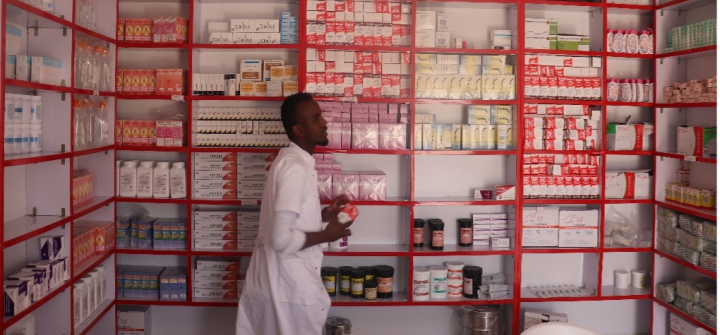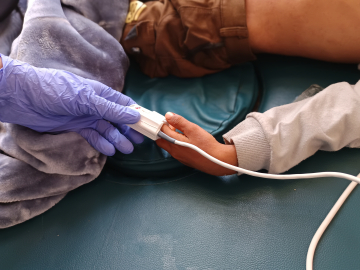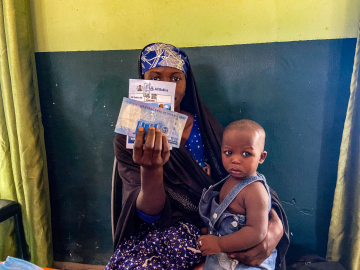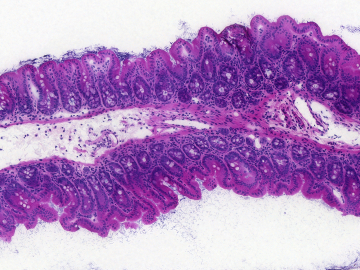Meeting the Moment: The Introduction of PCV in Somalia
Globally, 165 countries use the powerful pneumococcal conjugate vaccines (PCVs) to prevent a serious form of pneumonia, as well as meningitis and other near-fatal illnesses. But what of the 55 million children living in the remaining 29 countries where these vaccines are not available to all?
Somalia is one such country. With one of the highest child mortality rates in the world, pneumonia accounts for a quarter of all child deaths in Somalia each year. The number of pneumonia cases caused by pneumococcus is thought to be upwards of 66,000 annually, representing a staggering incidence rate over 50% higher than neighboring Ethiopia.
Health leaders from Somalia and Somaliland are determined to change the status quo. With new political leadership and recent improvements in child health—such as the introduction of inactivated polio vaccines in 2015 and the introduction of the second dose of measles in 2021—policymakers are fighting to bring lifesaving vaccines to their citizens, who include some of the planet’s most vulnerable children.
“Working in pediatric clinical settings, I’ve observed many children presenting with bacterial vaccine-preventable pneumonia, including those attributable to pneumococci,” said Saed Nuh, MPH, B.Pharm, Somaliland’s COVID-19 coordinator and head of the Ministry of Health’s Medicines Regulatory Authority, speaking from his personal perspective.* “The PCV vaccine will help to prevent childhood bacterial infections caused by pneumococci, a very common bacteria in different respiratory and other infections.”
“Childhood pneumonia is a major public health concern in Somalia and one of the leading causes of mortality in children,” said Ubah Farah Ahmed, MBBS, director of Somalia’s Family Health Department.
“All of our stakeholders are advocating for the vaccine,” said another leader in Somalia’s Health Ministry, adding that the PCV has been added to the work plan for 2023-2024, and leaders continue to pave the way to introduce PCVs; for security reasons, given an uptick in terrorist attacks, the official asked not to be identified. Still, ministry health officials confirm that many challenges remain, the leader said, not only with pandemic-related health system strains but also a refugee crisis and the worst drought in recorded history.
Additional obstacles:
- Gavi’s co-financing requirement for new vaccine procurement. However, momentum is growing to review and update these immunization financial policies to enable countries with fragile economies and conflict situations to access lifesaving vaccines.
- A pneumococcal vaccine rollout will need to prioritize the large numbers of Somalis living in temporary facilities, internally displaced by factors such as conflict and drought-induced crop failures and livestock losses. Saed said displaced, poor, and marginalized people are more affected by pneumonia as they have low access to vaccines and treatment.
- According to health leaders, given potential misunderstandings about PCV, the vaccine rollout will need to include comprehensive public communications. “PCV behavior change communication is very important because one of the contributing factors is lack of education,” she said.
- Ministry sources emphasized the need to control pneumonia through facility-level treatment and case management.
Introducing new vaccines: A silver lining to the pandemic response
While many countries delay adding new vaccines to their immunization program for years because of the strain associated with new introductions the COVID-19 vaccine rollout has, perhaps, helped increase country capacity to rapidly introduce vaccines.
- During 2021 127 low- and middle-income countries introduced COVID-19 vaccines, strengthening their cold chain, improving their training for vaccine delivery, and educating the public on the importance of vaccination.
- Somalia was one of these countries introducing the COVID-19 vaccine within a short time, paving the way for country to quickly introduce another new vaccine into its immunization program.
- Lessons from the COVID-19 vaccine rollout should be applied to PCV introduction. For instance, Saed suggests using coordination structures developed during the pandemic and prioritizing activities to generate demand in the lead-up to rollout.
While many challenges remain, the political commitment of Somalia’s health leaders to pneumonia control is evident.
Opportunity ahead: A stakeholder meeting in April 2023 will bring Somalian leaders together with leaders from other African countries that have not yet introduced PCVs to discuss remaining barriers and find solutions along with external partners.
The children of Somalia have endured much pain and loss. The world must offer equitable support to shield them from life-threatening pneumonia by ensuring the country can introduce PCVs with no further delays.
*Note: Individuals who are quoted here are sharing their personal perspectives. These do not necessarily represent the stances or opinions of any of the departments or programs they work for.
Mohamed Bobe, MBBS, is Health and Nutrition Program Manager at Save the Children International in Somalia. Dr. Bobe developed the commentary with Rose Weeks and Baldeep Dhaliwal of the Global Advocacy for PCV project of Johns Hopkins International Vaccine Access Center.
Join the 50,000+ subscribers in 170+ countries who rely on Global Health NOW summaries and exclusive articles for the latest public health news. Sign up for our free weekday newsletter, and please share the link with friends and colleagues:
A newly opened pharmacy, equipped with adequate essential medicine, at a Mother & Child Health centre in Xaraf, Somalia. Image courtesy of Save the Children Somalia.




